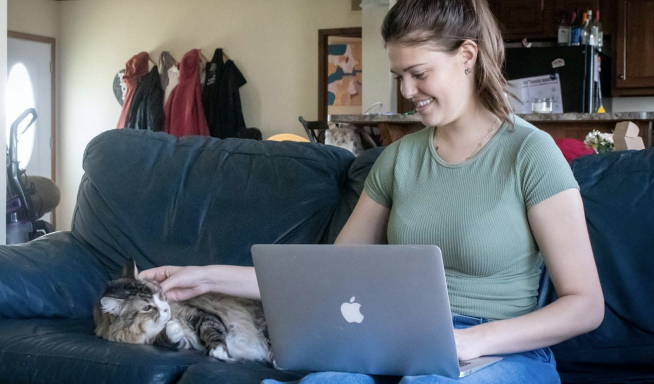Big, glossy green eyes gaze up at animal science junior Millie Mayo as she works to complete her homework for the week. Resting one hand on her cat’s coarse coat of hair, Mayo uses the other to type on her laptop.
“You get used to all the hair floating around,” Mayo said.
For 13 years, Mr. Whiskers has been in the Mayo family — for the last three he has lived with Millie Mayo as an emotional support animal.
After moving away from her family in Colorado, Mayo had Whiskers declared an emotional support animal in 2019 when she enrolled at Texas A&M. Like Mayo, other college students register pets as emotional support animals. The often-furry friends help combat loneliness and other fears commonly associated with big life transitions, according to Inside Higher Ed.
Pets provide a sense of comfort for students without their typical support system, said Mary Covey, the director of Counseling and Psychological Services at A&M.
“For many people, it is just the comfort of unconditional love,” Covey said. “And you feel that every time you’re around whatever that animal is to you.”
Kristie Orr, A&M’s director of Disability Resources, said emotional support animals aren’t super common on campus, but she has seen an increase in the number of registered animals since COVID-19 emerged in College Station in 2020.
“I think there was a time during the pandemic where people were at home alone with their animals and found comfort,” Orr said. “Now, we’re seeing a lot of people who are experiencing more levels of stress and mental illness, so having an animal with them can be a comfort, and we are seeing an increase in requests.”
It’s essential students discern the difference between emotional support and service animals, Orr said. Trained service animals
perform tasks that help people with disabilities and are permitted entrance anywhere the public is allowed. However, emotional support animals aren’t required to have any specific training and aren’t allowed the same accommodations.
“[Service animals] are active participants who are reacting to something either in their environment or related to their handler,” Orr said. “An emotional support animal is passive, so they just provide comfort to someone. They don’t react to the person by performing a specific task.”
On-campus emotional support animals must be registered through A&M’s Disability Services with the required certification, but service animals do not, Orr said.
Additionally, disabled people are not required to show documentation for their service animals to a landlord or other housing entity, according to the Americans with Disabilities Act. However, people with emotional support animals are required to show proof of certification for their animal for traveling and housing purposes.
“When I came to college, being away from home, there was a lot of new stress, and I wanted to be able to have my cat with me,” Mayo said. “Because I had stress and anxiety and some PTSD stuff, it was easy to get Whiskers certified since he was a comforting animal to me, and it made it so I could fly with him for free and have him live with me.”
Emotional support animals are one tool that people with mental health issues can use to cope, Orr noted, but they shouldn’t be seen as an end-all be-all for helping with mental illness..
“It’s just one piece to the puzzle,” Orr said. “[At Disability Services], we provide accommodations for all kinds of things, and accommodations are one tool, but there are other things that you can do, too. We definitely want students to use all of the tools they have and not just pick one and think that is all they need.”
For self-care, Mayo said Mr. Whiskers acts as a companion for her and helps during bouts of loneliness.
“It’s like having a constant friend to come home to every day,” Mayo said. “It sounds silly, but I get to take care of him, and he’s always there for me and taking care of me too.”
“I grew up with other pets, and Mr. Whiskers actually went through trauma when he was a baby, and he almost died,” Mayo said. “He got attacked by a fox, and I nursed him back to health after he got really, really hurt. I took care of him then, and now he’s taking good care of me.”
The ins and outs of emotional support animals
April 3, 2022
Photo by Photo by Aubrey Vogel
Mr. Whiskers has been a registered emotional support animal for three years for Millie Mayo since the junior moved to College Station from Colorado to attend Texas A&M.
Donate to The Battalion
Your donation will support the student journalists of Texas A&M University - College Station. Your contribution will allow us to purchase equipment and cover our annual website hosting costs.





















